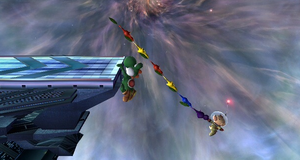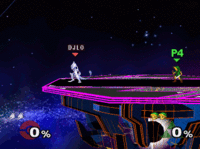Edgehogging: Difference between revisions
(Added sections, removed guide-like section.) |
MemeDedede (talk | contribs) m (it's not the actual players themselves, it's the characters that edgehog) |
||
| (39 intermediate revisions by 25 users not shown) | |||
| Line 1: | Line 1: | ||
{{ArticleIcons|ssb=y|ssbm=y|ssbb=y}} | {{ArticleIcons|ssb=y|ssbm=y|ssbb=y}} | ||
[[ | [[File:Edge Hog.png|thumb|In ''Brawl'', edgehogging prevents [[tether recovery|tether recoveries]] from grabbing on to ledges.|300px]] | ||
[[File:Runoffteleport.gif|thumb|{{SSBM|Mewtwo}} quickly edgehogging in ''Melee'' by running off the stage and using [[Teleport]] in the opposite direction to grab the [[edge]].]] | [[File:Runoffteleport.gif|thumb|{{SSBM|Mewtwo}} quickly edgehogging in ''Melee'' by running off the stage and using [[Teleport]] in the opposite direction to grab the [[edge]].]] | ||
''' | '''Edgehogging''' is a tactic in the first three games of the ''Super Smash Bros.'' series, where a character holds onto a [[ledge]] so that a [[recovery|recovering]] opponent cannot grab it, taking advantage of the fact that only one character may generally hold onto a ledge at a time. It is a specific type of [[edgeguarding]] in that it is a form of recovery disruption. | ||
==In '' | ==In ''[[Super Smash Bros.]]''== | ||
In '' | In the original ''Super Smash Bros.'', {{SSB|Fox}} and {{SSB|Ness}} can use the [[turn]] animation out of a [[dash]] to change the direction they are facing off of the edge and thus quickly grab it, preparing an edgehog. This technique is quicker and easier to time with Fox. | ||
==In ''Melee''== | ==In ''[[Super Smash Bros. Melee]]''== | ||
The most common method of | The most common method of edgehogging in ''Melee''{{'}}s competitive play is to [[wavedash]] back while near the edge, which should result with the [[character]]s sliding off of the stage, falling a short distance, and then quickly grabbing the edge. The character then usually uses the invincibility from the edge to avoid being hit by the opponent's recovery move. Other methods include [[moonwalk]]ing, doing a reverse [[neutral special]] then sliding off, using certain [[attack]]s which allow one to grab the edge faster or while attacking (i.e. {{SSBM|Bowser}}'s [[Whirling Fortress]]), or simply [[short hop]]ping back and grabbing the edge. Another method, called the '''pivot edgehog''', involves [[pivot]]ing very close to the [[ledge]]. The character will skid a short distance during the turn-around animation and land on the ledge. | ||
During the | During the edgehog, characters typically roll from the ledge, as it grants them invulnerability to the recovering opponent's attacks (usually [[up special]]) while still retaining possession of the ledge, in addition to usually lasting the longest of all actions and so hogging the edge for longer. | ||
Edgehogging in ''Melee'' earns the "Edge Hog" [[List of bonuses|bonus]]. The bonus is earned whenever one character is holding an edge and someone else moves into a spot where they can otherwise grab it, regardless of whether the edgehogged character is [[KO]]'d. | |||
==In ''Brawl''== | ==In ''[[Super Smash Bros. Brawl]]''== | ||
While it is easier to grab ledges in '' | While it is easier to grab ledges in ''Brawl'', successful edgehogging requires better timing because the player can no longer edgehog their opponent by rolling to the [[stage]] from the ledge. As a result, some players use hugging to edgehog their opponents when they aim their recovery move to the ledge. However, edge hogging should be done with precise timing and caution, because if one mistimes the edge hog, the invincibility will wear off and the edge hogger can be attacked, most likely by a deadly [[stage spike]]. | ||
==In later games== | |||
The edgehogging maneuver was removed in ''Super Smash Bros. 4'' due to changes to edge mechanics. Any character can steal the edge from the ledge-grabbing character [http://www.youtube.com/watch?v=BzAyE5P-60w&feature=youtu.be&t=2m06s], causing the previous ledge-grabber to be gently pushed away. This new technique is known as [[ledge trump]]ing [http://www.youtube.com/watch?v=2vVug_cxA6A]. | |||
==See also== | ==See also== | ||
Latest revision as of 22:44, October 31, 2024

Edgehogging is a tactic in the first three games of the Super Smash Bros. series, where a character holds onto a ledge so that a recovering opponent cannot grab it, taking advantage of the fact that only one character may generally hold onto a ledge at a time. It is a specific type of edgeguarding in that it is a form of recovery disruption.
In Super Smash Bros.[edit]
In the original Super Smash Bros., Fox and Ness can use the turn animation out of a dash to change the direction they are facing off of the edge and thus quickly grab it, preparing an edgehog. This technique is quicker and easier to time with Fox.
In Super Smash Bros. Melee[edit]
The most common method of edgehogging in Melee's competitive play is to wavedash back while near the edge, which should result with the characters sliding off of the stage, falling a short distance, and then quickly grabbing the edge. The character then usually uses the invincibility from the edge to avoid being hit by the opponent's recovery move. Other methods include moonwalking, doing a reverse neutral special then sliding off, using certain attacks which allow one to grab the edge faster or while attacking (i.e. Bowser's Whirling Fortress), or simply short hopping back and grabbing the edge. Another method, called the pivot edgehog, involves pivoting very close to the ledge. The character will skid a short distance during the turn-around animation and land on the ledge.
During the edgehog, characters typically roll from the ledge, as it grants them invulnerability to the recovering opponent's attacks (usually up special) while still retaining possession of the ledge, in addition to usually lasting the longest of all actions and so hogging the edge for longer.
Edgehogging in Melee earns the "Edge Hog" bonus. The bonus is earned whenever one character is holding an edge and someone else moves into a spot where they can otherwise grab it, regardless of whether the edgehogged character is KO'd.
In Super Smash Bros. Brawl[edit]
While it is easier to grab ledges in Brawl, successful edgehogging requires better timing because the player can no longer edgehog their opponent by rolling to the stage from the ledge. As a result, some players use hugging to edgehog their opponents when they aim their recovery move to the ledge. However, edge hogging should be done with precise timing and caution, because if one mistimes the edge hog, the invincibility will wear off and the edge hogger can be attacked, most likely by a deadly stage spike.
In later games[edit]
The edgehogging maneuver was removed in Super Smash Bros. 4 due to changes to edge mechanics. Any character can steal the edge from the ledge-grabbing character [1], causing the previous ledge-grabber to be gently pushed away. This new technique is known as ledge trumping [2].
